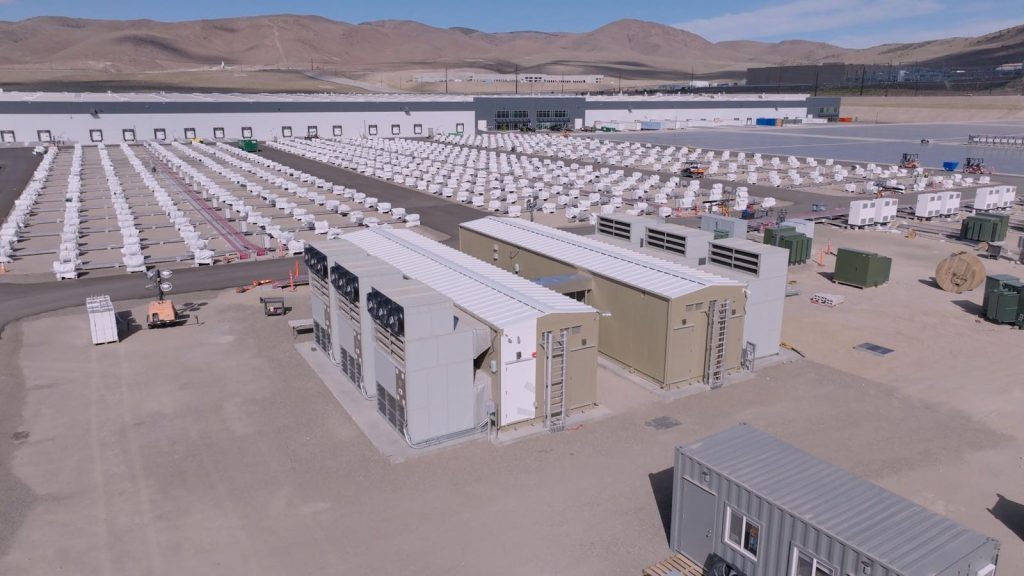A modular battery microgrid powers Redwood Materials’ Nevada campus.
Redwood Materials
Redwood Materials, the leading U.S. recycler of lithium-ion batteries and a growing supplier of materials for new ones, just raised $350 million to expand its ability to supply grid-scale energy storage systems as electricity demand, especially for AI data centers, surges.
The round, led by venture firm Eclipse with participation from Nvidia’s investment arm, boosted the Carson City, Nevada-based startup’s total funds raised to $2.2 billion. Redwood didn’t confirm its valuation as a result of the latest round, but people familiar with the matter said it’s over $6 billion.
Redwood said in a statement that the funds will “accelerate the expansion of our energy storage deployments, refining and materials production capacity,” and be used to grow its engineering and operations teams.
Tesla cofounder and board member JB Straubel, who Forbes estimates has a net worth of at least $2 billion, created Redwood in 2017 to help build up a U.S. supply base for critical materials needed to make lithium-ion batteries for electric vehicles and to reduce reliance on China. That started with recovering valuable elements, including cobalt, nickel, copper and lithium, from used batteries. All of these materials, which are mined globally but refined mainly in China, are then supplied to other companies as well as used to make cathode materials for new cells. In July, it partnered with General Motors to get lithium-iron phosphate (LFP) battery cells from the automaker for large-scale energy storage systems that are in high demand by utilities and AI data center operators.
For the latest in cleantech and sustainability news, sign up here for our Current Climate newsletter.
“The opportunity’s pretty immense across the board,” said Joe Fath, partner and head of growth for Palo Alto, California-based Eclipse. The long experience of Straubel and the team he’s put together at Redwood, including other Tesla veterans, in the battery business, is among the reasons the firm led the latest round.
“One of the things we focus on is manufacturing at scale and we help companies with that,” he said. “They have folks on the team that did this at Tesla, at Rivian, at other big-scale places. … That team is very capable and efficient. Most of the C-suite there came out of Tesla and they cut their teeth, not just in the EV business, but they were kind of the leaders in the energy storage business.”
Trump administration policies have been detrimental to the U.S. EV market. Last month, it phased out a federal tax credit for buying new and used electric models, and in February, it clawed back funds to build public charging stations, but grudgingly restarted the program in August after legal challenges from several U.S. states. Federal programs created by the Biden administration to boost clean energy production have also been gutted. But the Administration has been supportive of efforts to expand domestic production and refining of critical materials for batteries and electric motors, even taking equity stakes in a large new lithium mine and the only U.S. rare earth minerals mine, both of which are in Nevada.
And while federal programs created by the Biden administration to boost clean energy production have also been gutted, electricity prices have spiked, rising at more than double the rate of overall inflation. That means increasing demand for large batteries to store electricity generated from solar and wind farms, as well as natural gas turbines. Power-hungry AI data centers have been a major source of higher electricity demand, something that Nvidia, the top supplier of AI data center chips, is well aware of.
Closely held Redwood is far from the only company looking to grow its energy storage business. Tesla said on Wednesday its Megapack battery storage systems were a particular bright spot in the third quarter, rising 44% in value to $3.5 billion.
LFP cells, made mainly in China, are preferred for use in large energy storage batteries not only because they’re cheaper than more energy-dense lithium-ion cells traditionally used in electric cars — they’re also less likely to overheat and catch on fire.
“Redwood is creating a new generation of U.S.-made energy storage systems—scalable, low-cost, and designed to power data centers, industry, and the grid—reducing reliance on imported LFP batteries,” the company said, without providing prices and other details.
More From Forbes

